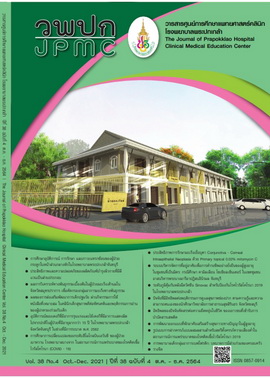Preliminary Genetic Analysis in Samutprakarn Cancer Patient for Familial Cancer Syndromes
Main Article Content
Abstract
BACKGROUND: Cancer continues to be the leading cause of death. Breast cancer is the most common cancer in women. Early cancer detection can improve overall survival, quality of life and reduce healthcare expenses. However, hereditary breast cancer syndromes can cause cancer at an early age before screening recommendations in clinical guidelines.
OBJECTIVES: Asymptomatic family member screening provides health benefits through breast cancer early detection.
METHODS: A prospective observational study enrolled breast cancer patients clinically indicated for genetic testing according to NCCN Guideline for Genetic/Familial High - Risk Assessment. Demographic data, cancer, and treatment data were collected. Blood samples were sent for cancer gene panel tests by next - generation sequencing. The significant association between clinical data and pathogenic variants or likely pathogenic variants (P/LP) in cancer genes was evaluated by χ2 or Fisher’s exact test.
RESULTS: Forty - one participants were enrolled in the study. Six patients had pathogenic variants in BRCA1, BRCA2, CDH1, PMS2, and WRN genes, and 15 patients had Variant of uncertain significance (VUS) in APC, ATM, BRCA1, CHEK2, FANCA, MLH1, MSH2, and NF1 gene. None of the patients had a family history of cancer. Histology grade of cancer was associated with gene mutation status.
CONCLUSIONS: Hereditary breast cancer can be identified in patients without a family history of cancer. Pathogenic mutations associated with breast cancer can be identified in several cancer genes. Therefore, cancer screening in asymptomatic high - risk family members can detect breast cancer early, improve survival and quality of life and reduce healthcare costs.
Article Details

This work is licensed under a Creative Commons Attribution-NonCommercial-NoDerivatives 4.0 International License.
References
Daly MB, Pal T, Berry MP, Buys SS, Dickson P, Domchek SM, et al. Genetic/Familial high-risk assessment: breast, ovarian, and pancreatic, version 2.2021, NCCN clinical practice guidelines in oncology. J Natl Compr Canc Netw 2021;19:77-102.
Daly MB, Pilarski R, Yurgelun MB, Berry MP, Buys SS, Dickson P, et al. NCCN guidelines Insights: genetic/familial high-risk assessment: breast, ovarian, and pancreatic, version 1.2020. J Natl Compr Canc Netw 2020;18:380-91.
Soliman NA, Yussif SM. Ki-67 as a prognostic marker according to breast cancer molecular subtype. Cancer Biol Med 2016;13:496-504.
Kanyılmaz G, Yavuz BB, Aktan M, Karaağaç M, Uyar M, Fındık S. Prognostic Importance of Ki-67 in breast cancer and its relationship with other prognostic factors. Eur J Breast Health 2019; 15:256-61.
Armstrong N, Ryder S, Forbes C, Ross J, Quek RG. A systematic review of the international prevalence of BRCA mutation in breast cancer. Clin Epidemiol 2019;11:543-61.
Lertwilaiwittaya P, Roothumnong E, Nakthong P, Dungort P, Meesamarnpong C, Tansa-Nga W, et al. Thai patients who fulfilled NCCN criteria for breast/ovarian cancer genetic assessment demonstrated high prevalence of germline mutations in cancer susceptibility genes: implication to Asian population testing. Breast Cancer Res Treat 2021;188:237-48.
Shenoy S. CDH1 (E-Cadherin) mutation and gastric cancer: genetics, molecular mechanisms and guidelines for management. Cancer Manag Res 2019;11:10477-86.
Corso G, Montagna G, Figueiredo J, La Vecchia C, Romario UF, Fernandes MS, et al. Hereditary gastric and breast cancer syndromes related to CDH1 germline mutation: a multidisciplinary clinical review. Cancers (Basel) [Internet]. 2020 [cited 2020 July 31] ;12(6):1598. Available form: https://www.mdpi.com/2072-694/12/6/1598/htm
Lee CT, Chow NH, Chen YL, Ho CL, Yeh YM, Lin SC, et al. Clinicopathological features of mismatch repair protein expression patterns in colorectal cancer. Pathol Res Pract [Internet]. 2021 [cited 2021 Apri 18]; 217:153288. Available form: https://www.sciencedirect.com/science/article/pii/S0344033820321439?via%3Dihub
Sheehan M, Heald B, Yanda C, Kelly ED, Grobmyer S, Eng C, et al. Investigating the link between lynch syndrome and breast cancer. Eur J Breast Health 2020;16:106-9.
Oshima J, Sidorova JM, Monnat RJ Jr. Werner syndrome: clinical features, pathogenesis and potential therapeutic interventions. Ageing Res Rev 2017;33:105-14.
Savva C, Sadiq M, Sheikh O, Karim S, Trivedi S, Green AR, et al. Werner syndrome protein expression in breast cancer. Clin Breast Cancer 2021;21:57- 73. e7.
Lindor NM, Johnson KJ, Harvey H, Pankratz VS, Domchek SM, Hunt K, et al. Predicting BRCA1 and BRCA2 gene mutation carriers: comparison of PENN II model to previous study. Fam Cancer 2010;9:495-502.
Panchal SM, Ennis M, Canon S, Bordeleau LJ. Selecting a BRCA risk assessment model for use in a familial cancer clinic. BMC Med Genet [Internet]. 2008[cited 2020July 31]; 9:116. Available form: https://bmcmedgenet.biomedcentral.com/track/pdf/10.1186/1471-2350-9-116.pdf
Parmigiani G, Berry D, Aguilar O. Determining carrier probabilities for breast cancer-susceptibility genes BRCA1 and BRCA2. Am J Hum Genet 1998;62:145-58.

